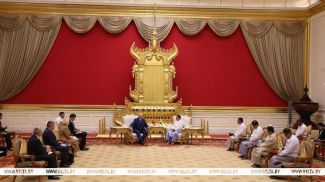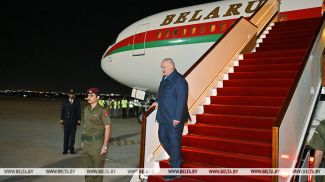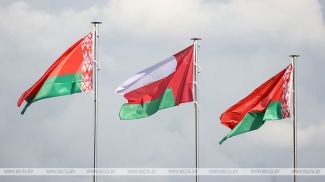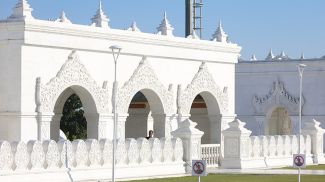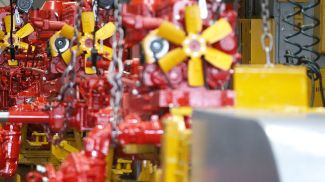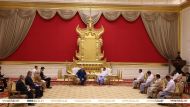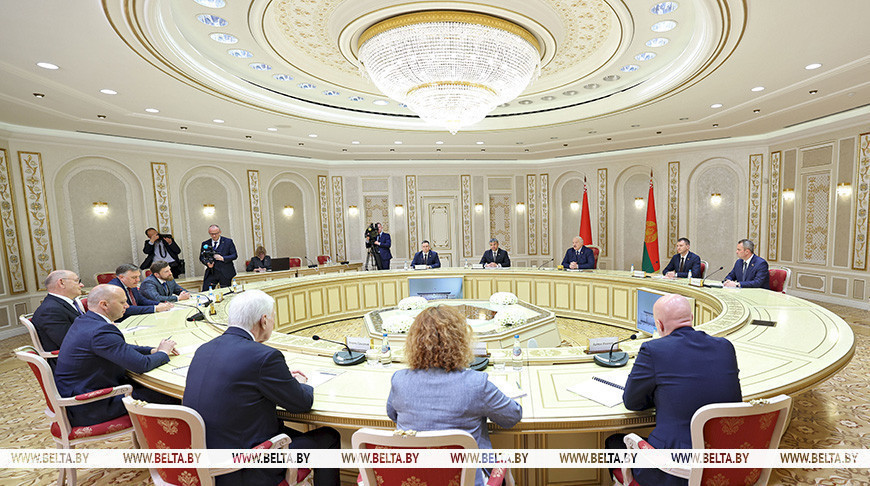
MINSK, 9 June (BelTA) – Belarus is ready develop cooperation with Russia's Kaliningrad Oblast across a wide range of areas, Belarusian President Aleksandr Lukashenko said during a meeting with Governor of Kaliningrad Oblast Alexey Besprozvannykh in Minsk on 9 June, BelTA has learned.
Welcoming the governor, the head of state noted that although this is their first meeting, Alexey Besprozvannykh has already visited Belarus and is familiar with the country and its capabilities.
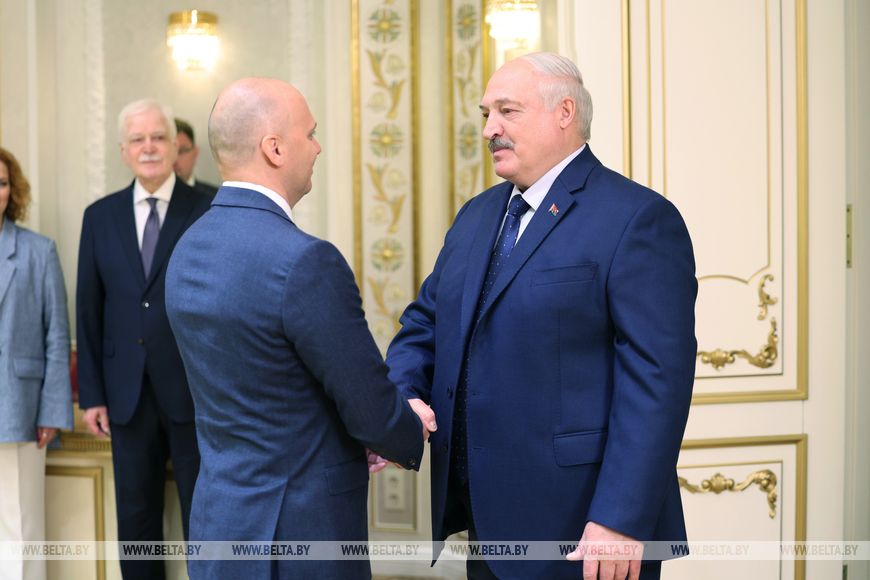
On a special sense of responsibility
The president recalled that during Soviet times, Belarus was responsible for Kaliningrad Oblast, figuratively speaking. Belarus and the Russian region have had a particular bond since then. "We are always ready to lend you a shoulder," Aleksandr Lukashenko assured. "We live in sovereign, independent states, but I always had this special sense of responsibility, when I visited Kaliningrad Oblast long ago and when people from there come to our country… Believe me, I feel my responsibility for this corner of our common homeland, as do all Belarusians. So you can count on us, and we will do our utmost to help you."
“The people of Kaliningrad Oblast are our kin people. We have always known this. If it were possible to count how many Belarusians there are among Russians and other nationalities there (but this is impossible to do, and I have never done this before), then the overwhelming majority would probably be Belarusians,” Aleksandr Lukashenko added.
On complex logistics and trade cooperation
Speaking about trade and economic cooperation with Kaliningrad Oblast, Aleksandr Lukashenko pointed out a slight decline in mutual trade, including exports from Belarus. According to him, Belarus is primarily responsible for this. "As an experienced industrialist, as far as I know [Alexey Besprozvannykh has long worked in the manufacturing industry and held the post of the deputy minister of industry and trade of Russia], you understand the situation and will make every effort, assist, and provide guidance so that Belarus and Kaliningrad Oblast do not fall behind in trade but instead set an example for others in trade growth. We will also strive to at least reach the previous levels [of mutual trade]," the president said.
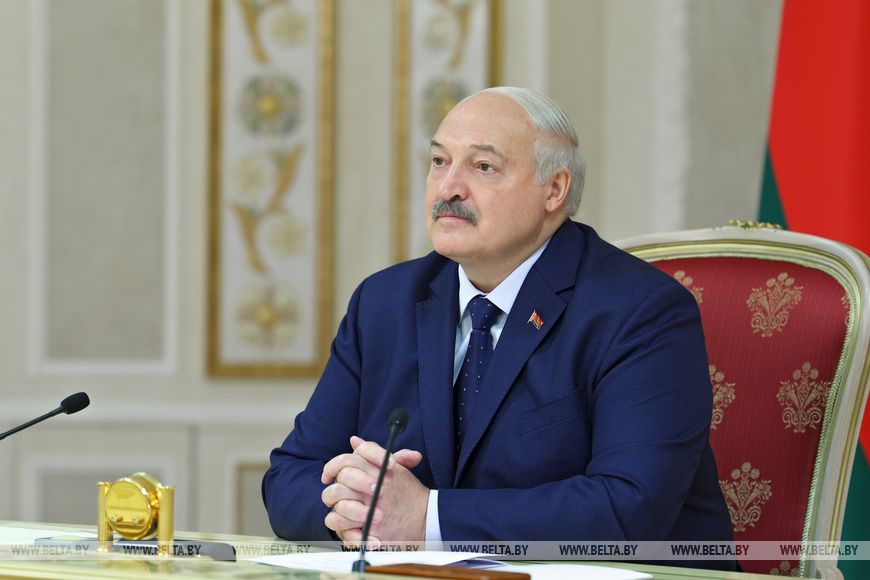
The head of state stressed certain logistical challenges in supplying goods to the Russian region, which results in Belarusian products taking long routes: first northward and then southwest. "But this does not justify the fact that our trade has slightly declined recently," Aleksandr Lukashenko said. He outlined several areas where both parties could strengthen cooperation.


On a special sense of responsibility
The president recalled that during Soviet times, Belarus was responsible for Kaliningrad Oblast, figuratively speaking. Belarus and the Russian region have had a particular bond since then. "We are always ready to lend you a shoulder," Aleksandr Lukashenko assured. "We live in sovereign, independent states, but I always had this special sense of responsibility, when I visited Kaliningrad Oblast long ago and when people from there come to our country… Believe me, I feel my responsibility for this corner of our common homeland, as do all Belarusians. So you can count on us, and we will do our utmost to help you."
“The people of Kaliningrad Oblast are our kin people. We have always known this. If it were possible to count how many Belarusians there are among Russians and other nationalities there (but this is impossible to do, and I have never done this before), then the overwhelming majority would probably be Belarusians,” Aleksandr Lukashenko added.
On complex logistics and trade cooperation
Speaking about trade and economic cooperation with Kaliningrad Oblast, Aleksandr Lukashenko pointed out a slight decline in mutual trade, including exports from Belarus. According to him, Belarus is primarily responsible for this. "As an experienced industrialist, as far as I know [Alexey Besprozvannykh has long worked in the manufacturing industry and held the post of the deputy minister of industry and trade of Russia], you understand the situation and will make every effort, assist, and provide guidance so that Belarus and Kaliningrad Oblast do not fall behind in trade but instead set an example for others in trade growth. We will also strive to at least reach the previous levels [of mutual trade]," the president said.

The head of state stressed certain logistical challenges in supplying goods to the Russian region, which results in Belarusian products taking long routes: first northward and then southwest. "But this does not justify the fact that our trade has slightly declined recently," Aleksandr Lukashenko said. He outlined several areas where both parties could strengthen cooperation.
Alexey Besprozvannykh noted that the two countries have set an ambitious goal: to bring trade to pre-sanction levels. "You say that the decline in trade is due to Belarus. That is absolutely not the case. We clearly see that the restrictions imposed by our unfriendly neighbors are precisely the reason preventing us from fully realizing our potential," he emphasized. "They are restricting our railway and road transport. We see a decline in these flows, which is due to the artificial barriers created by unfriendly neighboring countries. But business has already adapted. If we can't use these channels, we will deliver goods through others. Today, we have shifted to maritime transport."

On potential in construction and manufacturing industry
One of the areas where the parties need to enhance cooperation is construction. Belarus is ready to offer its expertise and specialists to design and construct various projects, including large-scale and complex ones. The president cited a joint project to build a CHP plant as an example: "I often cite this example: even Anatoly Borisovich Chubais was surprised that Belarusians could construct such a serious facility as the CHP plant that we built together," he said.
A traditionally promising area of cooperation is the supply of passenger transport of various types, including buses, electric buses, trams, and trolleybuses. "We know how to do this. We have preserved the competencies since Soviet times," Aleksandr Lukashenko noted.
The president pointed out that Alexey Besprozvannykh, who for several years has held the post of the deputy minister of industry and trade of Russia, is well acquainted with this sector of the economy and its importance for the country's development.
The head of state placed special emphasis on the potential for joint work in machine tool building. "Without machine tools, nothing happens in manufacturing industry. We have also maintained our machine tool production levels since Soviet times. Our machine tool industry is quite strong. We have made significant progress in this area. As you know, we produce lathes, milling machines, grinding machines, and other types of equipment," the president stated, highlighting the capabilities of Belarusian industry. He emphasized that the issue of domestic machine tool production has become increasingly urgent for both Russia and Belarus. As a result, a specialized joint program is being implemented to advance the machine tool industry.
Belarus is widely known for its capabilities in elevator manufacturing, and this area of cooperation can also be successfully developed. Moreover, Kaliningrad Oblast, like other regions of Russia and several post-Soviet countries, has a pressing need to replace outdated elevator equipment.
"Many of the elevators we installed during Soviet times have already exceeded their service life, leading to long waiting lists for new elevators in post-Soviet countries, and they have always been in short supply. But rest assured that if needed, we will manufacture the required number of elevators for Kaliningrad Oblast," the head of state said.
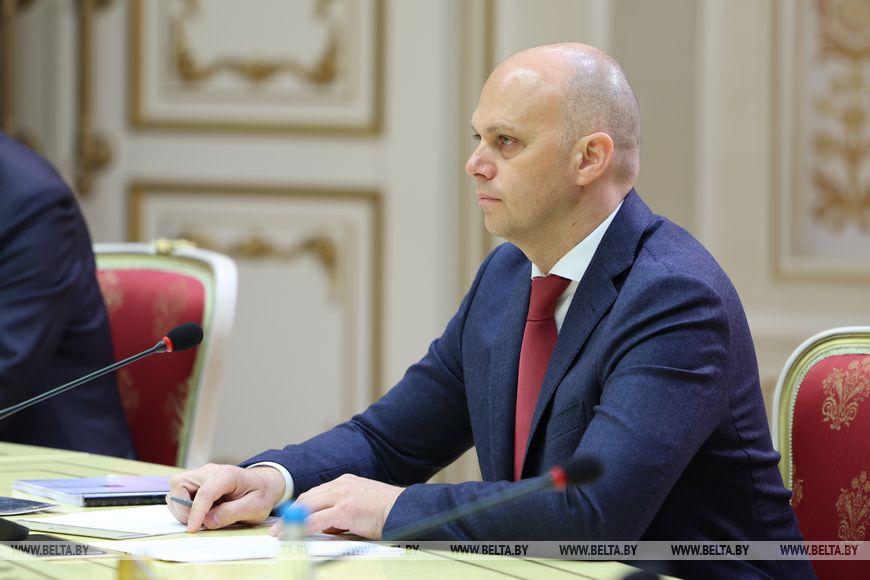
On food supplies
Aleksandr Lukashenko emphasized Belarus’ significant capacity to export a wide range of food products to the Russian region. Belarus already has experience in this area. In previous years, Belarusian agriculture was focused on supplying Kaliningrad Oblast, among other things.
"Rest assured that despite certain logistical challenges, we will provide the necessary amount of food products of all kinds, including the much-discussed potatoes. Today, the government has already informed me that new Belarusian potatoes are now available on store shelves," the president stated.
On trade in foreign markets and competition with the EU
During his meeting with the governor, the head of state addressed not only bilateral issues but also broader economic concerns. In particular, he emphasized the need to increase labor productivity and enhance competitiveness in foreign markets.
"We have someone to learn from. Let’s be honest: the Europeans are doing well in this regard," the president said.
He noted that given the labor shortage in Belarus, people from other regions of the world have started arriving in Belarus, which has caused some stir in society. “I say: OK, we won't invite anyone over here, although we have everything under control, but in this case labor productivity should be like in the European Union - three to five times higher. Indeed, if we cannot compete with the European Union, we have nothing to do there [reference to the trade in goods]; it is particularly true for Kaliningrad and Belarus. In fact, our economies are similar to that of the European Union. And we need to be able to compete with them. And this puts a worker at the forefront,” said Aleksandr Lukashenko.
"We are addressing these problems. And I am sure that we will solve them. The main thing is not to create additional problems. We need a normal key interest rate, so that manufacturers will be able to take loans and use them to produce and sell their goods. In the vast space of our Fatherland, people need everything. You can't name a single product that our people don't need. We need to keep this in mind. And if we have enough to export, it will be even better," the president added.
One of the areas where the parties need to enhance cooperation is construction. Belarus is ready to offer its expertise and specialists to design and construct various projects, including large-scale and complex ones. The president cited a joint project to build a CHP plant as an example: "I often cite this example: even Anatoly Borisovich Chubais was surprised that Belarusians could construct such a serious facility as the CHP plant that we built together," he said.
A traditionally promising area of cooperation is the supply of passenger transport of various types, including buses, electric buses, trams, and trolleybuses. "We know how to do this. We have preserved the competencies since Soviet times," Aleksandr Lukashenko noted.
The president pointed out that Alexey Besprozvannykh, who for several years has held the post of the deputy minister of industry and trade of Russia, is well acquainted with this sector of the economy and its importance for the country's development.
The head of state placed special emphasis on the potential for joint work in machine tool building. "Without machine tools, nothing happens in manufacturing industry. We have also maintained our machine tool production levels since Soviet times. Our machine tool industry is quite strong. We have made significant progress in this area. As you know, we produce lathes, milling machines, grinding machines, and other types of equipment," the president stated, highlighting the capabilities of Belarusian industry. He emphasized that the issue of domestic machine tool production has become increasingly urgent for both Russia and Belarus. As a result, a specialized joint program is being implemented to advance the machine tool industry.
Belarus is widely known for its capabilities in elevator manufacturing, and this area of cooperation can also be successfully developed. Moreover, Kaliningrad Oblast, like other regions of Russia and several post-Soviet countries, has a pressing need to replace outdated elevator equipment.
"Many of the elevators we installed during Soviet times have already exceeded their service life, leading to long waiting lists for new elevators in post-Soviet countries, and they have always been in short supply. But rest assured that if needed, we will manufacture the required number of elevators for Kaliningrad Oblast," the head of state said.

On food supplies
Aleksandr Lukashenko emphasized Belarus’ significant capacity to export a wide range of food products to the Russian region. Belarus already has experience in this area. In previous years, Belarusian agriculture was focused on supplying Kaliningrad Oblast, among other things.
"Rest assured that despite certain logistical challenges, we will provide the necessary amount of food products of all kinds, including the much-discussed potatoes. Today, the government has already informed me that new Belarusian potatoes are now available on store shelves," the president stated.
On trade in foreign markets and competition with the EU
During his meeting with the governor, the head of state addressed not only bilateral issues but also broader economic concerns. In particular, he emphasized the need to increase labor productivity and enhance competitiveness in foreign markets.
"We have someone to learn from. Let’s be honest: the Europeans are doing well in this regard," the president said.
He noted that given the labor shortage in Belarus, people from other regions of the world have started arriving in Belarus, which has caused some stir in society. “I say: OK, we won't invite anyone over here, although we have everything under control, but in this case labor productivity should be like in the European Union - three to five times higher. Indeed, if we cannot compete with the European Union, we have nothing to do there [reference to the trade in goods]; it is particularly true for Kaliningrad and Belarus. In fact, our economies are similar to that of the European Union. And we need to be able to compete with them. And this puts a worker at the forefront,” said Aleksandr Lukashenko.
"We are addressing these problems. And I am sure that we will solve them. The main thing is not to create additional problems. We need a normal key interest rate, so that manufacturers will be able to take loans and use them to produce and sell their goods. In the vast space of our Fatherland, people need everything. You can't name a single product that our people don't need. We need to keep this in mind. And if we have enough to export, it will be even better," the president added.





